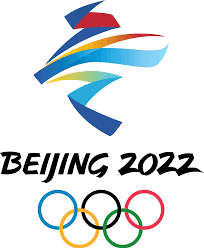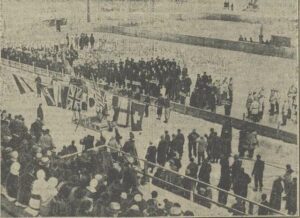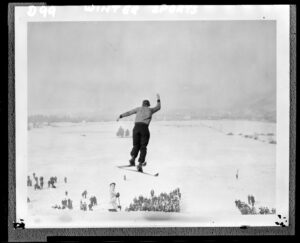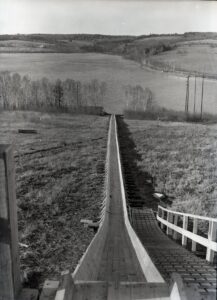Unlike the Summer Games, the Winter Olympics have fewer events and fewer competitors. The sports played during the Winter Games are Alpine Skiing, Biathlon, Bobsleigh, Cross-Country Skiing, Curling, Figure Skating, Freestyle Skiing, Ice Hockey, Luge, Nordic Combined, Short Track Speed Skating, Skeleton, Ski Jumping, Snowboard, and Speed Skating. Given that these events generally take place on snow or ice, the majority of the participating countries come from places where it’s cold enough.

Beijing Winter Olympics Logo Creative Commons
From 1928 the Winter Games were held every four years in the same calendar year as the Summer Games. In 1986 IOC officials, in response to concerns over the increasing cost and logistic complications of the Olympics, voted to alter the schedule. Only two years separated the 1992 Winter Olympics in Albertville, France, and the 1994 Games in Lillehammer, Norway. Thereafter, the Winter and Summer Games were each held quadrennially, alternating in even-numbered years.
History of Boycotts and why….
If you watched the opening ceremonies or have seen the news, the United States did not send any kind of governmental/political visitors to the Games in Beijing. The current US administration has decided against sending delegates due to supposed Human Rights violations against the minority Uyghur population. This is the FIRST year of boycotts where athletes from boycotting countries are participating and only the governmental agents are not attending.
The first boycott of the games occurred in 1956 when the Games were held in Melbourne, Australia. Four teams boycotted that year, in response to invasion of Egypt, now called the Suez Crisis or the Second Arab-Israeli War. Three countries boycotted due to the Soviet invasion of Hungary and the final country boycotted due to the presence of the Republic of China participating in the Games.
In 1964, the first Games to be televised, China, North Korea and Indonesia did not participate in these games due to issues surround the GANEFO (Games of the New Emerging Forces) held the previous year. These Olympics were held in Tokyo, Japan.

1932 Winter Olympics – Opening ceremony – Wikimedia Commons
The 1976 Games held in Montreal, Canada had a whopping TWENTY-NINE countries due to issues surrounding the New Zealand national Rugby team. The team had broken the embargo on Apartheid South Africa.
In 1980, at the height of the Cold War, the Games were held in Moscow, Russia. While 80 nations participated, 66 countries, led by the United States, boycotted the Games due to the Soviet-Afghan war.
In 1984, the Games were held in Los Angeles, California. Fourteen Eastern Bloc including East Germany and the Soviet Union, boycotted the games in response to the boycott of the 1980 games.
The Games in 1988 were the last Olympics with any major boycott. The Games were held in Seoul, South Korea and allies of North Korea including Cuba, Albania, Ethiopia and the Seychelles did not return the invitations of the IOC (International Olympic Committee). Nicaragua and Madagascar did not participate due to financial difficulties.
Maine Links to the Games:
Del Duca, a 30-year-old Bethel native, is a graduate of Telstar High School and the University of Maine.

Digital Commons Identifier G547-343234-D99 Person Coming Off A Ski Jump – George W. French, photographer
Del Duca is scheduled to compete in the two-man bobsled on Feb. 14 and 15. He is scheduled to compete in the four-man bobsled on Feb. 19 and 20.
Born in Indiana and raised in Germany, Reed has a degree in exercise science from the University of Maine, where he was a member of the track and field team.
Reed, 30, is scheduled to compete in the two-man bobsled on Feb. 14 and 15. He is scheduled to compete in the four-man bobsled on Feb. 19 and 20.
Sweeney, 28, was born in Portland and lived in Windham and Falmouth before moving to Connecticut at age 10. She said her sister, Megan, also a Team USA Olympic luger, got her into the sport. In 2010, Emily lost the final Vancouver Olympic team berth to sister Megan in a special race-off.
Sweeney competed in her first Olympics in 2018 in Pyeongchang, South Korea, crashing during her final run.
She’s scheduled to compete on Feb. 7 and 8.
Egan, 34, graduated from Cape Elizabeth High School in 2006 before attending Wellesley College and the University of New Hampshire.
Egan could potentially compete in the following biathlon events:
Nordic skiing/Cross-Country Skiing
Laukli, 21, graduated from Yarmouth High School in 2018.
She is scheduled to compete in the 30K Nordic ski event on Feb. 20.
Amalie Andersen and Rahel Enzler
Defenseman Amalie Andersen and forward Rahel Enzler, both current University of Maine women’s hockey players, are playing for Denmark and Switzerland, respectively.
Denmark will play in Group B and take on China in its Olympic women’s ice hockey debut on Feb. 4. Switzerland will play the United States on Feb. 6.
Tereza Vanisova, Vendula Pribylova, and Michelle Weis
Vanisova and Pribylova are on the Czech Republic women’s hockey team and Weis plays for Denmark.
All three are former members of the UMaine women’s hockey team.

1939 An image scanned from a black and white negative of the view down a steep toboggan slide in the area of Dexter, Maine. (Notice that it lands in a lake). Bert Call, photographer. From DigitalCommons@UMaine
Wayne Lamarre and Dr. Allyson Howe
Two Maine sports medicine professionals are treating the U.S. women’s hockey team in Beijing.
Dr. Allyson Howe is the team physician. She works at InterMed in South Portland as a family and sports medicine doctor. This is her third trip to the Olympics. Her first was to Sochi in 2014 with the Olympic Committee. In 2018, she traveled with the U.S. women’s hockey team to Pyeongchang as the team physician, a role she is taking on again in Beijing.
Wayne Lamarre is the director of the University of New England’s athletic training program and a clinical professor. He also worked with the U.S. Women’s National Team at the USA Hockey Women’s Winter Training Camp in Blaine, Minnesota, in December 2015, and has more than 30 years of sports medicine experience. The 2022 Winter Olympics will be Lamarre’s first Olympic experience.
Maine ties section information is from News Center Maine. Please follow this link for interviews and more information.
posted: , by Raminta Moore